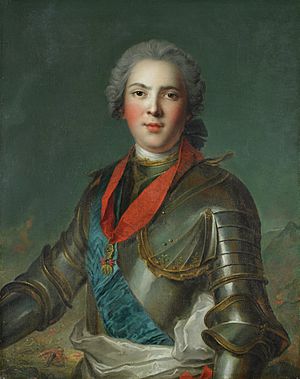Louis, Dauphin of France (1729–1765) facts for kids
Quick facts for kids Louis |
|||||
|---|---|---|---|---|---|
| Dauphin of France | |||||
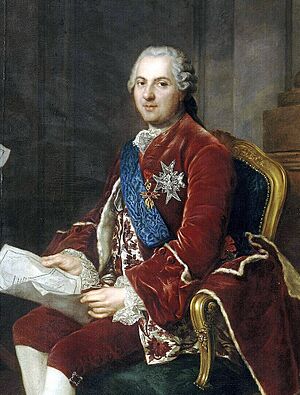
Portrait by Anne Baptiste Nivelon, 1764
|
|||||
| Born | 4 September 1729 Palace of Versailles, Paris, France |
||||
| Died | 20 December 1765 (aged 36) Château de Fontainebleau, France |
||||
| Burial | Cathédrale Saint-Étienne de Sens Saint Denis Basilica (heart) |
||||
| Spouse |
|
||||
| Issue more... |
|
||||
|
|||||
| House | Bourbon | ||||
| Father | Louis XV | ||||
| Mother | Marie Leszczyńska | ||||
| Signature |  |
||||
Louis, Dauphin of France (Louis Ferdinand; 4 September 1729 – 20 December 1765) was the elder and only surviving son of King Louis XV of France and his wife, Queen Marie Leszczyńska. As a son of the king, Louis was a fils de France. As heir apparent, he became Dauphin of France. Although he died before ascending to the throne himself, all three of his sons who made it to adulthood were to later rule France: Louis XVI (reign in 1774–1792), Louis XVIII (1814–1815, again in 1815–1824) and Charles X (1824–1830).
Contents
Early life and education
Louis's birth secured the throne and his mother's position at court, which previously had been precarious due to her giving birth to three daughters in a row before the birth of the Dauphin. He had a younger brother, Philippe, who died as a toddler.
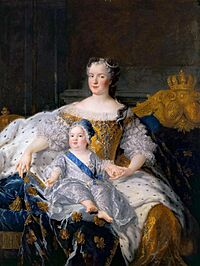
Louis was baptised privately and without a name by Cardinal Armand de Rohan. On 27 April 1737 when he was seven years old the public ceremony of the other baptismal rites took place. It was at this point that he was given the names Louis Ferdinand. His godparents were his cousin Louis, Duke of Orléans, and his great-great-aunt the Dowager Duchess of Bourbon.
Louis's governess was Madame de Ventadour who had previously served as his father's governess. When he was seven years old, the Duke of Châtillon was named his governor, the Count of Muy was named under-governor, and Jean-François Boyer, formerly bishop of Mirepoix, was named preceptor.
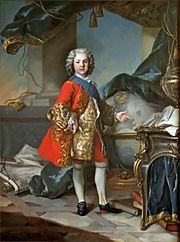
From an early age Louis took a great interest in the military arts. He was bitterly disappointed when his father would not permit him to join the 1744 campaign in the War of the Austrian Succession. When his father became deathly ill with fever at Metz, Louis disobeyed orders and went to his bedside, much to the king's resentment. The incident resulted in the dismissal of Louis's beloved governor, the Duke of Châtillon. Later, in 1745, Louis was able to accompany his father on his Flanders campaign and witness the Battle of Fontenoy. After Fontenoy, Louis was not allowed to participate in battles, in part due to the king's escalating jealousy and increasingly distant attitude toward his son. He was very close and protective to his mother and sisters, especially Henriette.
First marriage
In 1744 Louis XV negotiated a marriage between his fifteen-year-old son and the eighteen-year-old Infanta María Teresa Rafaela of Spain, daughter of King Philip V of Spain and his Italian wife, Elisabeth Farnese, and first cousin of Louis XV. The marriage contract was signed 13 December 1744; the marriage was celebrated by proxy in Madrid on 18 December 1744 and in person at Versailles on 23 February 1745.
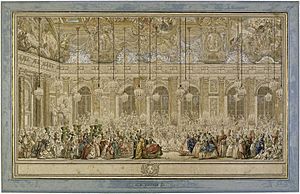
Louis and María Teresa Rafaela were well matched and had a real affection for each other. They had one daughter, Princess Marie Thérèse of France (19 July 1746 – 27 April 1748). Three days after the birth of their daughter, María Teresa Rafaela died on 22 July 1746. Louis was only 16 years old. He grieved intensely at the loss of his wife, but his responsibility to provide for the succession to the French crown required he marry again quickly.
In 1746, Louis received the Order of the Golden Fleece from his father-in-law, King Philip V of Spain.
Second marriage
On 10 January 1747, Louis was married by proxy in Dresden to Maria Josepha of Saxony, the fifteen-year-old younger daughter of Frederick Augustus II, Prince-Elector of Saxony and King of Poland, and his wife Archduchess Maria Josepha of Austria. A second marriage ceremony took place in person at Versailles on 9 February 1747.
Children
- Stillborn son (30 January 1748)
- Stillborn son (10 May 1749)
- Marie Zéphyrine of France (26 August 1750 – 1 September 1755); died in childhood.
- Louis Joseph of France, Duke of Burgundy (13 September 1751 – 22 March 1761); died in childhood.
- Stillborn daughter (9 March 1752)
- Xavier of France, Duke of Aquitaine (8 September 1753 – 22 February 1754); died in infancy.
- Louis XVI of France (23 August 1754 – 21 January 1793); married Archduchess Maria Antonia of Austria, known as Marie Antoinette, and had issue.
- Louis XVIII of France (17 November 1755 – 16 September 1824); married Princess Marie Joséphine of Savoy, no issue.
- Stillborn son (1756)
- Charles X of France (9 October 1757 – 6 November 1836); married Princess Maria Theresa of Savoy and had issue.
- Marie Clotilde de France (23 September 1759 – 7 March 1802); married Charles Emmanuel IV of Sardinia, no issue.
- Stillborn son (1762)
- Élisabeth of France (3 May 1764 – 10 May 1794); died unmarried and without issue.
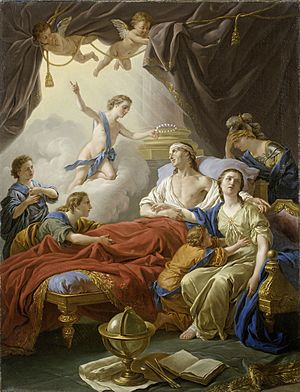
Personality
Louis was well educated: a studious man, cultivated, and a lover of music, he preferred the pleasures of conversation to those of hunting, balls, or spectacles. With a keen sense of morality, he was very much committed to his wife, Marie-Josèphe, and disapproved of his father's mistresses. Family friend Duke de Luynes and Abbe de Proyart noted in their memoirs that like his pious mother, Louis even at a young age, donated much of his money in supporting various charitable causes for the poor which made him popular with the French populace.
Very devout, he was a fervent supporter of the Jesuits, like his mother and sisters, and was led by them to have a devotion to the Sacred Heart. He appeared in the eyes of his sisters as the ideal of the Christian prince.
Later life and death
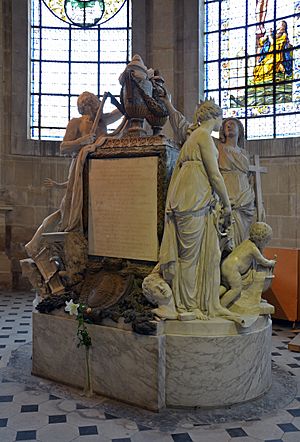
Kept away from government affairs by his father, Louis was at the center of the Dévots, a group of religiously minded men who hoped to gain power when he succeeded to the throne.
Louis died of tuberculosis at Fontainebleau in 1765 at the age of 36, while his father was still alive, so he never became king of France. His mother, Queen Marie Leszczyńska, and his maternal grandfather, the former king of Poland, Stanislaus I Leszczyński, Duke of Lorraine, also survived him. His eldest surviving son, Louis-Auguste, duc de Berry, became the new dauphin, ascending the throne as Louis XVI at the death of Louis XV, in May 1774.
Louis was buried in the Cathedral of Saint-Étienne in Sens at the Monument to the Dauphin of France & Marie-Josephe of Saxony, designed and executed by Guillaume Coustou, the Younger. His heart was buried at Saint Denis Basilica next to his first wife.
Ancestry
| Ancestors of Louis of France | |||||||||||||||||||||||||||||||||||||||||||||||||||||||||||||||||||||||||||||||||||||||||||||||||||||||||||||||||||||||||||||||||||||||||||||||||||||||||||||||||||||||||||||||||||||||||||||||||||||||||||||||||||||||||||||||||||||||||||||||||||||||||||||||||||||||||||||||||||||||||
|---|---|---|---|---|---|---|---|---|---|---|---|---|---|---|---|---|---|---|---|---|---|---|---|---|---|---|---|---|---|---|---|---|---|---|---|---|---|---|---|---|---|---|---|---|---|---|---|---|---|---|---|---|---|---|---|---|---|---|---|---|---|---|---|---|---|---|---|---|---|---|---|---|---|---|---|---|---|---|---|---|---|---|---|---|---|---|---|---|---|---|---|---|---|---|---|---|---|---|---|---|---|---|---|---|---|---|---|---|---|---|---|---|---|---|---|---|---|---|---|---|---|---|---|---|---|---|---|---|---|---|---|---|---|---|---|---|---|---|---|---|---|---|---|---|---|---|---|---|---|---|---|---|---|---|---|---|---|---|---|---|---|---|---|---|---|---|---|---|---|---|---|---|---|---|---|---|---|---|---|---|---|---|---|---|---|---|---|---|---|---|---|---|---|---|---|---|---|---|---|---|---|---|---|---|---|---|---|---|---|---|---|---|---|---|---|---|---|---|---|---|---|---|---|---|---|---|---|---|---|---|---|---|---|---|---|---|---|---|---|---|---|---|---|---|---|---|---|---|---|---|---|---|---|---|---|---|---|---|---|---|---|---|---|---|---|---|---|---|---|---|---|---|---|---|---|---|---|---|---|---|---|
|
|||||||||||||||||||||||||||||||||||||||||||||||||||||||||||||||||||||||||||||||||||||||||||||||||||||||||||||||||||||||||||||||||||||||||||||||||||||||||||||||||||||||||||||||||||||||||||||||||||||||||||||||||||||||||||||||||||||||||||||||||||||||||||||||||||||||||||||||||||||||||
See also
 In Spanish: Luis de Francia (1729-1765) para niños
In Spanish: Luis de Francia (1729-1765) para niños


